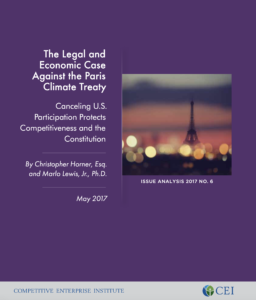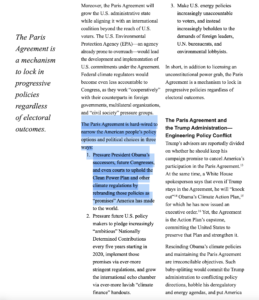The 25th Conference of the Parties to the 1992 UNFCCC begins today in Madrid, seeking to add more details to what is by all historic factors a treaty for U.S. purposes.
Our supposed models in Western Europe ratified Paris as a treaty under their systems, by their legislatures, while we played make believe that Paris — “the most ambitious climate agreement in history”, i.e., more ambitious than two prior treaties — wasn’t a treaty.
This was because the U.S. system by design takes treaty commitments more seriously than other nations, making entry into such obligations more difficult with a constitutionally required two-thirds supermajority of all Senators present voting in favor in order to commit us.
That treaties are hard is not a reason to disregard the Senate’s role, but to take care to respect it. There is one big reason to withdraw.
There is also the climate litigation aspect, with Paris also having been immediately touted to the 9th Circuit Court of Appeals in Juliana v United States, the Climate Kidz suit seeking judicial seizure of energy and environment policymaking from the legislative branch. This brief was filed on behalf of an organization with strong ties to the climate litigation industry here in the U.S.
Withdrawal is critical to protect U.S. interests, and citizens, for numerous reasons foremost among which is the increased litigation risk from claiming membership.
Fortunately President Trump announced his intention to withdraw the U.S. from Paris, in a June 2017 Rose Garden speech. He followed this up early last month by sending a letter formally initiating U.S. withdrawal.
Unfortunately, Pres. Trump’s chosen path for withdrawal is the worst of his three options for doing so — as in, the least durable, particularly in the event he is replaced in 2021 rather than 2025.
This necessity, and those three options, are laid out in a 2017 paper for the Competitive Enterprise Institute by Marlo Lewis PhD and GAO’s Chris Horner, “The Legal and Economic Case Against the Paris Climate Treaty: Canceling U.S. Participation Protects Competitiveness and the Constitution“.


